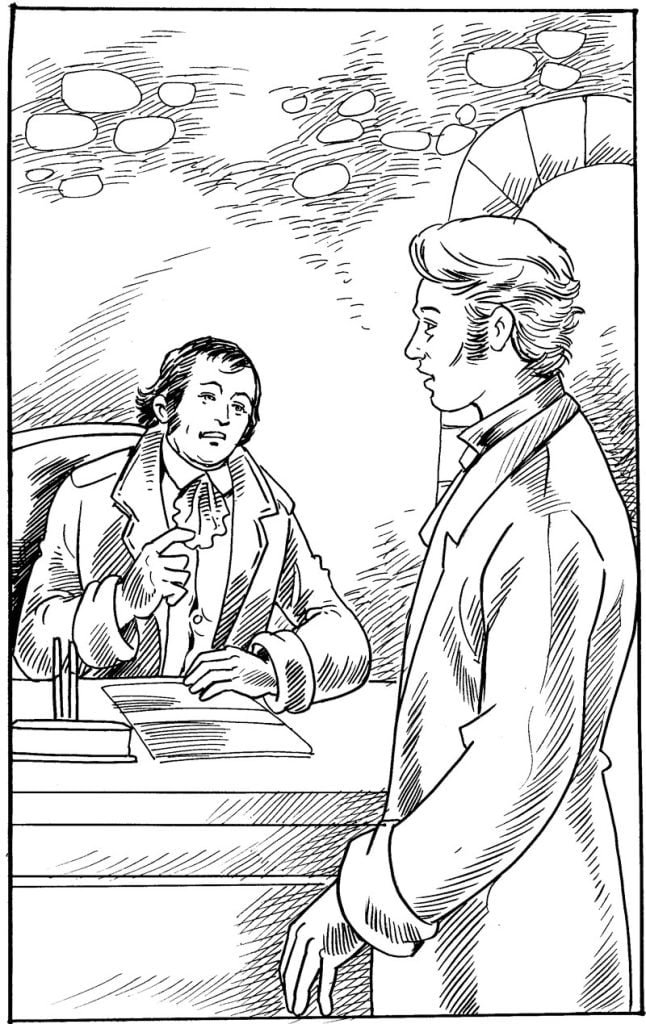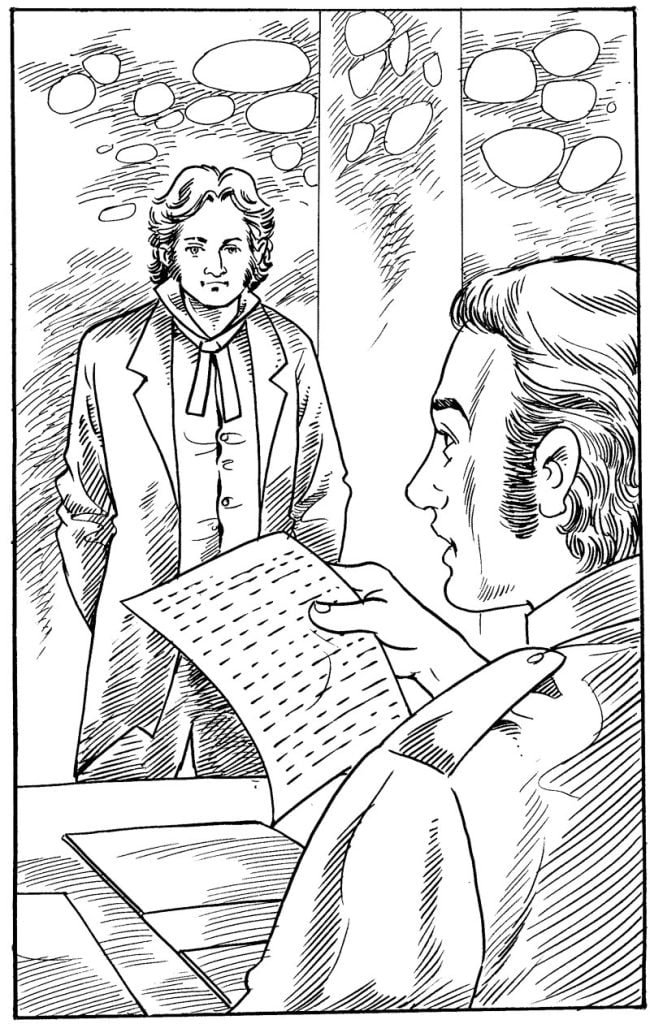Chapter 3
As Edmond departed, old Monsieur Dantes collapsed in a half-faint. He had been in poor health, and the excitement of having Edmond home and about to be married had overtired him. Now the horror of seeing his beloved son marched away between soldiers proved too much.
A chair was brought, and the old man was helped into it. Mercedes rubbed his hands to warm them.
“Dear Father, calm yourself,” she said, “Edmond will return in a short while. You saw how he smiled. It is some silly mistake. Perhaps the person responsible for it is apologizing at this moment.”
Monsieur Dantes looked into her eyes. He saw the same fear in them that he knew showed in his own. “No Mercedes,” he whispered, “I feel something terrible is going to happen to Edmond.”
Hearing the old man speak his own fears, Mercedes turned from him and buried her face in her hands. A sob escaped her.
Seeing the terrified old man and young girl, Caderousse frowned. He tried to remember exactly what had happened at the table outside the inn the day before. It was hard because he had been in a drunken haze. But enough realization of what was going on had come through. He whispered to Danglars, “This is some part of the trick you were going to play, you and Fernand. It is shameful!”
Danglars looked at him coldly. “I know nothing about this arrest. Your drinking has confused you. Be quiet!” said Danglars.
Since Monsieur Morrel was an important person, he knew that he might be able to find out the reason for Edmond’s arrest. So he had followed the soldiers and their prisoner. Now, as he returned to the inn, a worried expression clouded his face. He went straight to Monsieur Dantes and Mercedes. “My friends,” he said solemnly, “a very serious charge has been made against Edmond. Someone has accused him of being a secret agent for Napoleon and thus a traitor to the King!”
Meanwhile, in the office of the Assistant Prosecutor, these same accusing words were being said to Edmond Dantes. The Prosecutor himself was ill in bed and had sent his capable assistant, Monsieur Villefort, to deal with the matter. The two men were alone in the room, though the soldiers stood on guard outside the door.
Edmond stared in amazement at the Assistant Prosecutor. “No, sir; I am not a secret agent. I have no political opinions. I am only a sailor, and my concerns are my ship, my father and my intended wife.”

Villefort, older than Edmond by only ten years, was impressed by the sincere way in which Edmond uttered his statement. Villefort also saw intelligence in Edmond’s face, though he realized the young man’s education was confined to the matters of the sea and sailing. Finally, it was of interest to him that he and Edmond shared a coincidence. Both had been celebrating their wedding feasts and had been interrupted in the middle of the festivities. Villefort’s mind wandered for a moment to the lovely, rich young noble woman he was to marry.
Then Villefort brought his thoughts back to his duty and said. “Tell me, Monsieur Dantes, why did you stop the Pharaon at Elba and pick up a letter there?”
Edmond told his story so convincingly that Villefort believed him. He asked to see the letter, but Edmond hesitated.
“I have sworn, sir, to give this letter only to the person to whom it is addressed,” he explained, “It is a man in Paris.”
Edmond’s loyalty increased Villefort’s admiration for him. It was obvious that the young sailor was a person of honour and that his claim to innocence was completely true. Villefort smiled reassuringly and said, “I represent the law here, and the law commands you to hand over the letter. In doing so, you will not break your word because my soldiers could take it from you by force. Give me the letter with your conscience clear.”
At these words Edmond smiled too and said, “I give you the letter gladly, sir. Though you are the law, you respect a man’s honour.” From the inside pocket of his jacket Edmond brought out a sealed white envelope and handed it to Villefort.
The Assistant Prosecutor turned away from Edmond towards the lamp on his desk so that he might have more light by which to read the name on the envelope. Thus Edmond did not see the look of horror which came over Villeforts face when he read the name. Fearing for a moment that he might faint, Villefort steadied himself against his desk. He dared to read the name again and the familiar address in Paris. It still read, “TO MONSIEUR NOIRTIER.” The letter was addressed to Villefort’s father!
Villefort had often told himself that one day this moment would happen the moment when all he had. worked for would vanish and he would be disgraced. But lately, as he became rich and attained the position of Assistant Prosecutor, he thought less and less about that moment. The final step into a secure life was his engagement to Renee.
He had used his mother’s name, Villefort, on coming to Marseilles, so none connected him with the notorious traitor, Noirtier, who was loyal to Napoleon. Politically, Noirtier had been quiet for years, but as Villefort now read in the letter, his father was to come out of hiding and lead a plot to restore Napoleon to the throne.
As a loyal subject of the King, Villefort could not allow the letter to be delivered, but neither could he bring himself to have his own father arrested. This was not because he loved him, but because he feared that the connection between them would inevitably be revealed. Villefort made his decision quickly, then turned back to Edmond.
“Who has seen this letter beside yourself?” he asked in a calm voice.
Edmond answered with surprise, “I told you, sir. None has seen it. I myself have not read the letter since it was sealed. But none has even seen the envelope since I received it.”
Inwardly, Villefort gave thanks. He also gave thanks for the illness of his superior, an illness which had prevented the Prosecutor from coming to the office today. If he had read the letter, Villefort would have been a ruined man. But now, Villefort began to hope. He smiled at Edmond again and lowered his voice.
“I believe you, Dantes. But having this letter as evidence is awkward. It is the only thing that supports the accusation made against you in this note we received.” He handed Edmond the note written by Danglars with his left hand. Though the note was crumpled, Fernand had smoothed it out before he sent it. The signature still read “A Friend,” with no further identification.

Edmond read it and shook his head in bewilderment. “I don’t know who could have written this,” he said.
Villefort returned the accusation to a folder marked ‘Edmond Dantes’. Then he took up the letter addressed to his father and turned it over in his hands, as if trying to decide a deep problem. Suddenly, he winked at Edmond and strode to the fireplace. He tossed the letter into the flames. “I believe you are innocent, Dantes. Therefore I destroy the only evidence that exists against you.” As Villefort saw the name “Noirtier” disappear into ashes, his heart beat normally again.
“Thank you, sir,” said Edmond, “You are more like my true friend than the King’s Prosecutor.”
“But now,” said Villefort, returning to his desk, “you must take my advice. You must swear never to mention this letter or the name to whom it was addressed. Only you and I know it once existed.”
“I swear to tell none,” agreed Edmond eagerly, “If anyone questions me, I will deny such a letter ever existed.”
“Now, I must detain you a short while longer until I have written a report,” said Villefort, as an afterthought. He rang for the captain of the guards, then said something to him in a low tone of voice, so Edmond could not hear. To Edmond he said, “Go with him, Dantes.”
Edmond saluted Villefort and followed the captain of the guards with a light heart. He counted himself a lucky man to have had his case heard by the Assistant Prosecutor rather than the Prosecutor. Villefort had said he must only stay ‘a short while longer’. Perhaps in an hour or less he would be back at Mercedes side.

